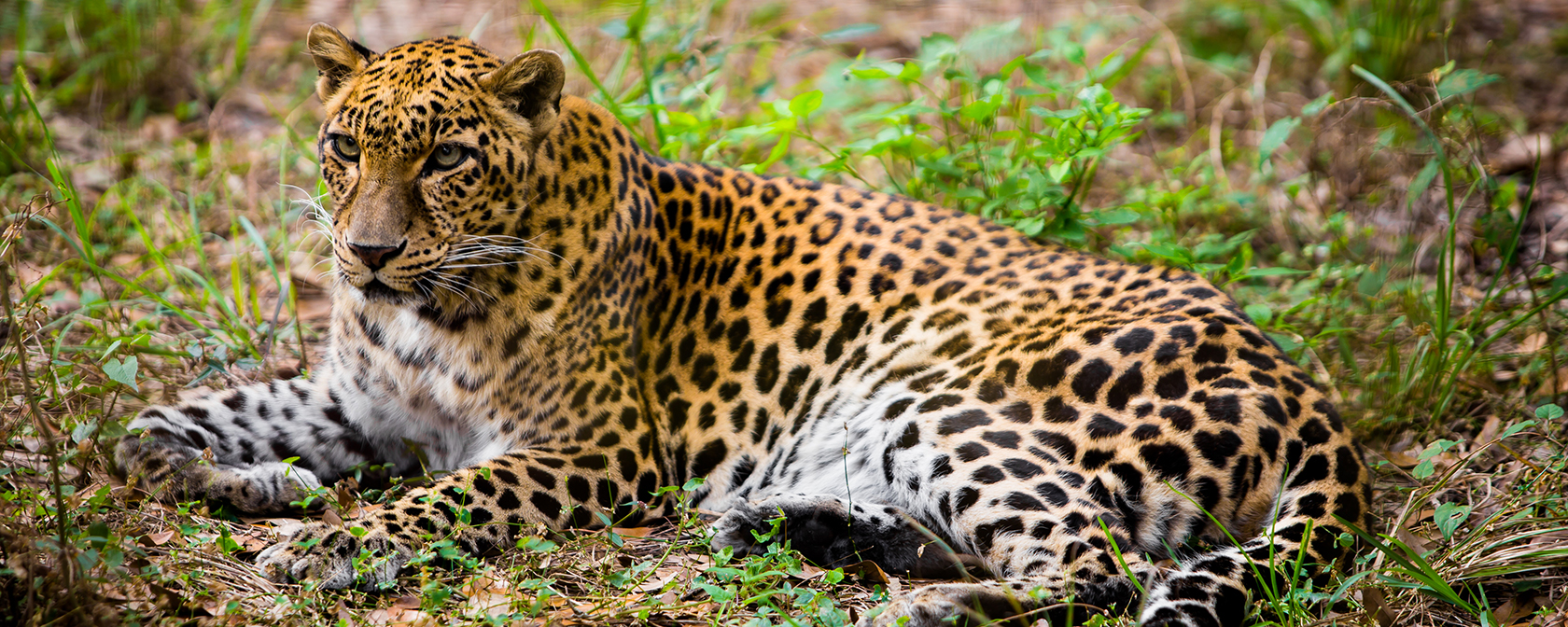By Sara Amundson and Kitty Block
African leopards are magnificently powerful animals who can take down prey animals ten times their size. But despite their strength, leopards are no match for trophy hunters, who go to great lengths to lure the animals to their deaths and bring back their body parts as trophies.
Here’s how a typical leopard hunt goes: Trophy hunters hire a company, a “hunting outfitter,” to put bait, night after night, in the leopard’s territory and bring the hunter to kill the leopard only after the leopard has become acclimated to this food source. The hunter, guided by the outfitter, lurks in the dark night and waits for the hungry leopard to arrive. When the leopard comes to the bait, a bright spotlight blinds the leopard while the hunter takes his shot.
Hunters often miss their mark, wounding the leopard who limps off into the dark bush to hide. Often, the hunter is unwilling or unable to find and kill the animal, who is left to suffer from the wounds.
Who hunts leopards?
The drain of leopards from Africa to the U.S. is a disgrace. Today, Humane Society International and the Humane Society of the United States, in coalition with a conservation organization, sued the U.S. Fish and Wildlife Service to protect African leopards from the dire threat they face from U.S. trophy hunters.
Poorly regulated trophy hunting, which is the only kind of leopard trophy hunting there is, threatens the survival of the species. There are no reliable population estimates for African leopards, which means it’s impossible to ensure that hunting quotas do not harm leopard populations. Based on the information that is available (such as prey base depletion data), leopard experts say that leopards in sub-Saharan Africa have likely suffered a population decline of approximately 30% over the past 22 years.
Hunters—mostly American and European—go to Africa in droves to kill leopards and bring home their trophies. From 2014 to 2018, the bodies of at least 2,836 African leopards, about 567 per year, were exported as hunting trophies from the countries where they were killed. The U.S. imports over half of all leopard hunting trophies, far more than any other country: 1,488 over the five-year period, or 297 per year on average.
In addition to trophy hunting, the species is threatened by habitat loss and fragmentation, loss of prey, poaching for illegal trade and direct persecution as livestock predators.
Even though the species receives some protections under the U.S. Endangered Species Act, the conservation status of the African leopard continues to decline. While leopards in Asia and northern Africa are listed as “endangered” under the Act, and receive the highest level of federal protections, leopards in 18 countries in sub-Saharan Africa are listed as “threatened.” In order to import a trophy of a species listed as “endangered,” the U.S. has an additional layer of oversight to determine if the import benefits the survival of the species. Hunting trophies of these threatened leopards, however, are exempt from this critical import consideration. That means that these sub-Saharan leopards are fair game for those cruel trophy hunts.
A short history of our long fight to save leopards
In July 2016, Humane Society International and the Humane Society of the United States, along with other conservation and animal protection organizations, petitioned the U.S. Fish and Wildlife Service to extend full endangered species protections to all leopards throughout their range. Enhancing protections in this way would provide much-needed increased federal oversight over leopard imports into the U.S.
The Service was legally required to make a decision on our petition to list all leopards as endangered by July 2017, and yet, four years later, it has still failed to do so, despite acknowledging that such a listing may be warranted. The Service also has failed to respond to our petition to stop exempting leopard trophies from critical import restrictions needed to curb this destructive practice. The lawsuit we filed today challenges the Service’s failure to take desperately needed action to protect the species from the U.S. trophy trade.
African leopards need these protections now more than ever. For the first time in several years, the government of South Africa announced that it intends to imminently open up trophy hunting of its delicate leopard population. As with so many other countries, the leopard hunting quota in South Africa would be divorced from any basis rooted in facts or science.
The Fish and Wildlife Service has an opportunity to ensure that U.S. trophy hunters won’t further contribute to the decline of the species in South Africa and elsewhere on the continent—it’s far past time that it do so.
How you can help
Leopards desperately need protection from American trophy hunters, so we are suing the U.S. Fish and Wildlife Service to ensure that leopards remain in the wild tomorrow and forever. You can help leopards and other victims of trophy hunting by signing this pledge.
Kitty Block is President and CEO of the Humane Society of the United States.




